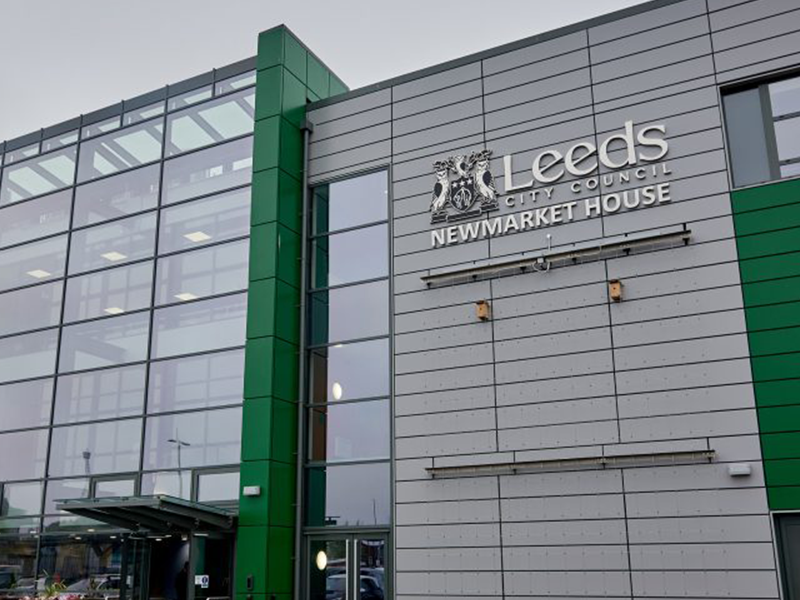All content on this case study was created prior to the acquisition of EB Charging by Blink Charging.
The Vision
Leeds is one of the fastest-growing cities in the UK. It has pledged as part of its Green Initiative to not purchase internal combustion engine (ICE) vehicles for its fleets by 2025, prompted by the Central Government’s directives around clean air zones and the city’s obligations for air quality. Leeds City Council (LCC) charged Andrew Hickford with improving fleet efficiency and air quality to align with the Council’s transport and climate emergency strategies.
What LCC Did
Leeds started transitioning their van fleets to zero-emissions vehicles. Andrew Hickford, Project Manager of Sustainable Energy and Air Quality, built a business case to justify the transition, as the project was not government funded. Although for some attributes of the project, the Council was able to take advantage of some grants and funding; the workplace charging grant and the plug-in vehicle grant, they also used the Government’s Home Charge Grant, which partially funded the home charging trial, though this funding has since been withdrawn.
Alongside the grants, LCC’s project team assessed the city’s current van fleet, and the potential financial benefits of a centralised fleet procurement became apparent. With a long-term outlook, EVs could be a financially beneficial solution, but this meant an increased purchase cost to the Council. By changing how the fleet budgets were managed and working with whole-life costs rather than purchase price alone, LCC was able to put forward a business case for the transition to EVs that supported the Council’s targets for decarbonisation.
The Solution
To support the Council’s business case, EB Charging proposed an engagement trial be put out to the public to help improve uptake and boost the viability of the plans. A telematics analysis scheme was implemented, and EB provided training and support for all participants.
Telematics
The trial scheme targeted businesses, SMEs, the third sector, the public sector, and charities, providing them with access to electric vans and private hire vehicles for free on a short loan basis. With EB’s guidance, the EV trial vans were fitted with telematics. The equipment recorded data to generate bespoke reports for businesses that outlined projected running costs, total EV costs, and projected savings over five or seven years. Telematics also allowed Leeds to manage vehicles more effectively, driving efficiency and usage to reduce maintenance costs.
Install domestic chargers
The Council also trialled a home charging scheme in conjunction with the telematics scheme allowing staff to take fleet vehicles home and provide them with the necessary tools to charge the EVs. EB worked with a pilot group, installing domestic charging points. The trial provided data analysis reporting on the kilowatt hours required per vehicle when charged at drivers’ homes, providing details for reimbursement costs to staff (based on Ofgem’s price cap), monitor mileage, and vehicle performance.
The Results
From the trials, LCC found that just over 97% of participants would recommend the scheme, and around 79% said their opinion of EVs had changed for the better.
ELECTRIC VANS
More than 200 trials with 192 local businesses resulted in a total of 97,388 miles travelled, and the businesses collectively saved an estimated £29,450 and 29 tonnes of CO2.
DOMESTIC CHARGING
The home trials proved a success financially, and the pilot became part of LCC’s fleet EV strategy, with over 100 home chargers installed across the city. This effectively supplemented the depot charging and supported the fleet of almost 400 electric vehicles LCC has in operation.
ELECTRIC PRIVATE HIRE
The 28 trial vehicles in the scheme travelled 85,263 miles, saving an estimated average of £5,365, and 6 tonnes of CO2 per vehicle compared to their diesel or petrol equivalents.
The experience was so positive that participants in the scheme have already bought over 40 zero-emissions vehicles, and over half of trialists of EV private hire have shared that they are looking to buy an EV. The project allowed LCC to demonstrate how they work as a city organisation, working towards zero emissions and improving air quality. By 2018 Leeds recorded having 36 electric vans and continues to grow year on year as petrol and diesel vehicles reach their end of life.
Future Proofing
Leeds City is working towards two key targets. The first to not buy diesel or petrol vehicles, and the entire fleet will be electric by 2025. Secondly, the fleet supports the city’s target to be net carbon neutral by 2030. Following the success of this transition, Leeds has the vision to expand this programme to
incorporate larger vehicles such as refuse collection trucks. The business case for a fleet of EV refuse collection vehicles is challenging, but the council has already started procurement of the first EV-RCVs.
For more information on how EB Charging can support your Fleet transition to EV contact us today
Recommend for You
Stay Informed
Join our mailing list for hot news and company updates.




